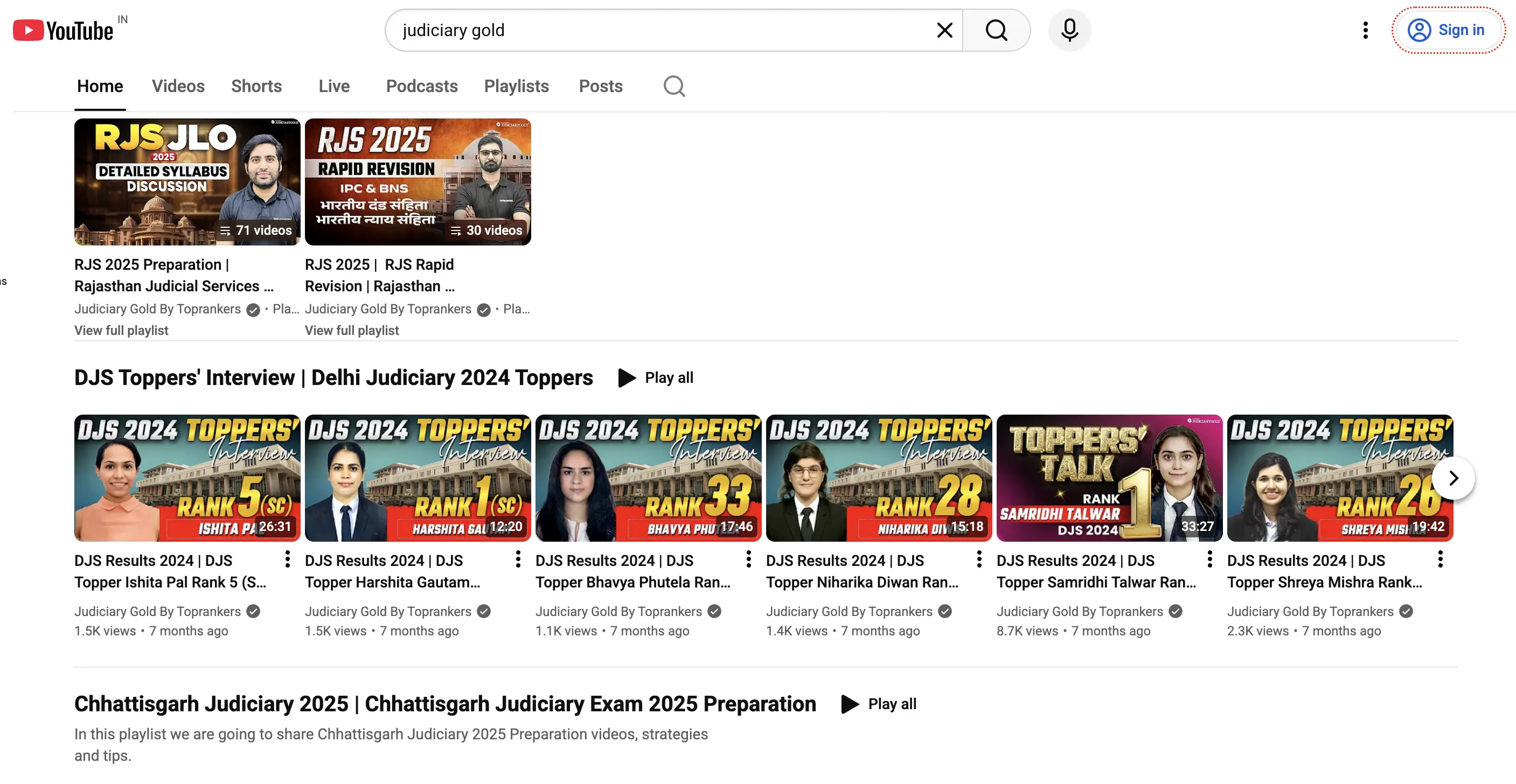Judiciary Gold - Best Judiciary Coaching Youtube Channel In India
October 22, 2025
You’re serious about cracking Judiciary—PCS-J, DJS, RJS, MPJS—and you want a free, structured place to start. Welcome. In this guide, we’ll help you cut through the noise and actually use YouTube like a proper study system. We’ll show why Judiciary Gold stands out, what to watch first, how to build a weekly rhythm, and when to switch from free to paid—without wasting months figuring it out yourself.
Who this is for (and how to use this guide)
-
First-time aspirants who need hand-holding on syllabus flow, PYQs and note-making
-
Working professionals who can study only 1–2 hours on weekdays and go heavy on weekends
-
Repeaters who need PYQ-first revision and main answer-writing discipline
Use this page as a mini-playbook: pick your “Start-Here Path”, follow the 30-day sprint, and copy the note-making workflow. That’s it.
How we picked the “best” (our scoring checklist)
The best channel should make you faster, sharper, and exam-aligned. Here’s the checklist we use.
| Criterion | Why it matters | What good looks like |
|---|---|---|
| Content depth & accuracy | Avoid half-baked concepts | Section-wise coverage with case law anchors |
| Pedagogy & clarity | Reduces revision cycles | Visual scaffolding, examples, drills |
| Playlist structure | Saves time | State-wise + subject-wise + level-wise |
| PYQ integration | Predicts exam behaviour | Topic → PYQ → Mixed mocks |
| Mains answer-writing | Converts knowledge to marks | Structured demos + frameworks |
| Consistency & cadence | Builds habit | 4–7 long videos/week + Shorts |
| Community & doubt-solving | Keeps you moving | Lives, pinned timestamps, PDFs |
| Conversion path | For when you need more | Clear bridge to mocks, evaluation |
Winner spotlight: Judiciary Gold (why it stands out)
One-line USP: State-wise mastery, PYQ-first problem-solving, and playlists that behave like a free course.
Snapshot
| Signal | Details |
|---|---|
| Content pillars | Doctrinal lectures (Evidence, CPC, CrPC, Limitation, Constitution), State-specific series (UP/DJS/RJS/MPJS), PYQ discussions, Mains writing drills, Strategy sessions, Toppers’ insights |
| Navigation | Clean playlists for states/subjects; easy to “binge in order” |
| Cadence | Frequent long-form classes + regular lives; Shorts for quick hits |
| What learners feel | “I know exactly what to watch next—and how to revise it later.” |
What to watch first (a 7-step start-here path)
-
Orientation: how to use the channel + save time with playlists
-
Pick your state: quick explainer to lock UP/DJS/RJS/MPJS
-
Syllabus map + booklist (no overbuying; focus texts only)
-
Core concepts sprint: Evidence + CPC (high-weightage)
-
PYQ sampler (Prelims): topic-wise → year-wise
-
Mains answer-writing demo: structure, flow, and speed
-
Recent live strategy/AMA: pin doubts, grab summary PDF
Playlists that make life simple
Use this table to map your first month.
| Playlist | Who it’s for | Outcome |
|---|---|---|
| UP PCS-J Crash/Revision | First-timers eyeing UP | A→Z coverage with quick recalls |
| DJS Mains Writing Drills | Repeaters, mains-focused | Structure + model answers |
| Limitation Act Mini-Series | Everyone (fast scoring) | 45–60 min clarity + PYQ grip |
| Evidence Act PYQs | All states | Pattern recognition, traps avoided |
| 45-Minute Capsules (Daily) | Working pros | Daily win + zero backlog guilt |
A weekly routine that actually sticks
-
Weekdays (Mon–Fri): one 45–60 min concept video + 20 PYQs from that topic
-
Weekends (Sat–Sun): one long revision class + 1 mock discussion + notes clean-up
-
Every 2 weeks: written self-audit (topics done, PYQs solved, weak spots)
3-step loop
-
Learn a focused concept (playlist first)
-
Practise PYQs (topic → year → mixed)
-
Review notes with a 5-minute “what changed” reflection
Notes, PYQs & answer-writing: your exact workflow
Note-making (15-minute rule)
-
Write only what you’ll reuse: section/illustration, rule, common traps, 1–2 landmark cases.
-
Add margin tags:
Rev-7,Rev-30,PYQ?,Mains -
Keep a “Case Law Parking Lot” page per subject (name, court, ratio, 1-line use)
PYQ routine
-
Sequence: topic-wise → year-wise → mixed sets
-
Session format (25 minutes): 15 mins solve + 10 mins error log
-
Error log columns: Q-ID, topic, error type (concept/haste/guess), fix
Mains answer-writing (3 answers/week)
-
Framework: Issue → Rule → Application → Conclusion (+ authority)
-
Timer: 7–9 minutes per 10 markers
-
Peer-review cue: “Would I award 6/10? If not, what’s missing in Rule or Application?”
Live sessions & community: squeeze more value
-
Use pinned timestamps to jump to your segment
-
Drop doubts with context (state, attempt, exact clause) to get a useful answer.
-
Grab description links (PDFs, playlists) and save to a single Drive folder named.
-
Polls: vote for next topic—you’ll get content that fits your plan
Free vs paid: when to upgrade (honest take)
| Track | Pros | Cons | Best for |
|---|---|---|---|
| Free (YouTube) | Zero cost, broad coverage, flexible timing | No personalised evaluation, limited discipline | Explorers, self-driven learners, early prep |
| Structured Program | Guided plan, mocks with checked answers, 1:1 feedback, doubt groups | Cost, fixed schedule | Serious attempt within 6–9 months, repeaters |
Rule of thumb: If your mock scores stagnate for 3–4 weeks, or you cannot self-evaluate main answers objectively, consider upgrading.
Competitive snapshot (so you see the difference)
| Channel trait | Judiciary Gold | Typical Alternatives |
|---|---|---|
| State-wise sequencing | Strong (UP/DJS/RJS/MPJS) | Patchy/Generic |
| PYQ integration | Systematic (topic → mixed) | Ad-hoc |
| Main writing demos | Regular frameworks | Sporadic |
| Playlist hygiene | Clean, predictable flow | Mixed/duplicated |
| Conversion path (when you need more) | Clear bridge to mocks & reviews | Unclear |
30-day sprint plan (bookmark this)
Goal: lock fundamentals + practise PYQs + begin main muscle. Print this as your wall plan.
| Day Range | Focus | What to do | Output |
|---|---|---|---|
| 1–3 | Orientation + State | Watch start-here + choose state; set booklist; create folders | Map of syllabus + drive setup |
| 4–7 | Evidence (Core 1) | Daily 45–60 min concept + 20 PYQs | 80 PYQs solved + 4 pages notes |
| 8–10 | CPC (Core 2) | Same cadence | 60 PYQs + 3 pages notes |
| 11–12 | Limitation | Mini-series + quick PYQs | 30 PYQs + cheat-sheet |
| 13–14 | Mixed Prelims Set | 1 mock discussion + error log | Error log v1 |
| 15–17 | Constitution (Core 3) | Concept + PYQs | 60 PYQs |
| 18–19 | Mains Writing | 3 answers using IRAC+Authority | 3 checked answers (self/peer) |
| 20–22 | CrPC (Core 4) | Concept + PYQs | 60 PYQs |
| 23–24 | Mixed Mock + Live | Attempt mock + attend live doubts | Next week's fix list |
| 25–27 | Evidence/CPC Revision | Rewatch timestamps + revise notes | Condensed notes v2 |
| 28–30 | State-specific Focus | Your state playlist + PYQs | State readiness snapshot |
Daily time budget (working professional): 60–90 mins weekdays; 3–4 hrs weekends. If you can do more, funnel it into PYQs and mains writing.
Common mistakes (skip these)
-
Binge-watching without pausing to write keywords or ratios
-
Postponing PYQs “for later” (later never comes)
-
Writing main answers only in the last month
-
Not maintaining an error log
-
Jumping playlists randomly—finish a cluster before hopping
Your next 15 minutes (do this now)
-
Subscribe and save the state + subject playlists you need
-
Download a one-page 30-Day Sprint version of this plan (make yourself a simple Google Doc)
-
Open a fresh error log (4 columns: Q-ID, Topic, Error Type, Fix)
-
Watch the Evidence start-here video and solve 10 PYQs right after
Why Judiciary Gold wins our recommendation
Because it doesn’t just “upload videos.” It gives you a navigable path that mirrors how toppers study: tight playlists, PYQs at the centre, frequent lives, and regular nudges toward writing answers. That combination saves you months. And in this exam, saved months compound into marks.
Frequently Asked Questions
How should a beginner structure the first 14 days on the channel?

How do I pick the right state playlist if I’m undecided?

How do I revise efficiently before a mock?

Can I rely only on YouTube booklists?

Can Shorts really help with Judiciary prep?

1689072975.png)



SHARE